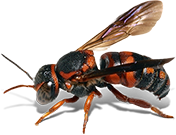Why Get Certified?
Certification can lead to better visibility, opportunities, and jobs. In today's increasingly complex and highly-specialized economy, credentials are so important. Sure, you know you've got the skills to do the job, but how do you convince potential customers and employers you do? For many career-minded professionals, certification is often the answer.
For some entomologists, it is recognized as a valuable way to prove professional credentials to non-entomologists and the general public. For others, the topic can generate a puzzled response. Why become certified? Isn't a college degree and/or years of practical hands-on experience enough to establish one's credentials? Either response of yes or no is correct, depending on your clientele and colleagues.
Consider the doctor, plumber, architect, lawyer, or building inspector. These are all professionals just like you. They have been educated in their field. They have spent years working in the field, and in some cases, earning their degrees, but credentialing is an important and recognized step of their career.
Is certification right for you? Consider the following questions:
- Do you work frequently with the public, or among other professionals who are not scientists?
- Does your employer require you to stay current with the latest industry developments?
- Is there a lot of competition in your field of work (e.g., do you need to stand out from the crowd)?
- Are you considering switching jobs and want to make the best impression possible?
- Are you the kind of person who likes to be the best at what you do?
- Are you required to maintain an annual license as a professional to practice?
If you answered "yes" to any of the questions above, then consider getting certified today. Many professionals (such as crop consultants, administrators, public health, veterinary, urban entomologists, and pest control professionals) use their certification status to give themselves a competitive edge.
What ESA Offers:
The Entomological Society of America offers four credentials:
- Associate Certified Entomologist (ACE). This certification has been designed especially for professionals whose training in entomology has been achieved through continuing education, self study, and on-the-job experience.
- Board Certified Entomologist (BCE). This certification has been designed for professionals with a degree in entomology or a closely-related field. A college degree is required to become a BCE and most BCEs hold either a BS or post-graduate degree in entomology.
- Certified IPM Technician (CIT). This certification is designed for professionals with one to four years of experience in Pest Control, and requires the applicant be qualified to apply pesticides in the jurisdiction where they work. Since the credential is geared towards those with less experience, it will focus primarily on IPM procedures related to the most common household pests.
- Public Health Entomology (PHE). This certificate is designed for professionals who work with pests that pose adverse health risks (including but not limited to vectors for disease). Applicants should have at least five years of experience of verifiable pest management or vector control experience.
